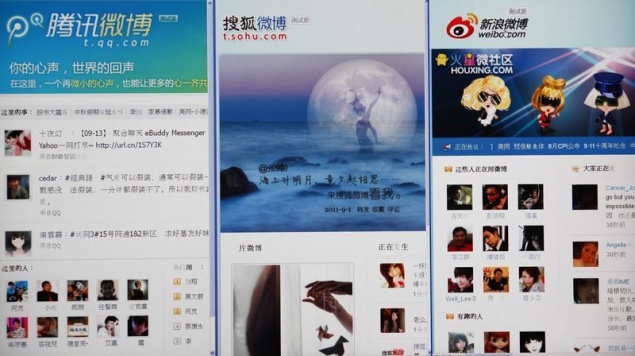- Home
- Internet
- Internet News
- China's online rumour crackdown has made the Internet "clean", says official
China's online rumour crackdown has made the Internet "clean", says official

China has the world's most sophisticated online censorship system, known outside the country as the Great Firewall. It blocks many social media websites, such as Twitter, Facebook, YouTube and others, along with many sites hosted in Taiwan and those of rights groups and some foreign media agencies.
The crackdown on online rumours is really intended to quash anti-government discourse, activists say. High profile users of Sina Weibo, China's Twitter-like microblog, have been targeted, apparently for political speech.
(Also see: China employing two million people as "web police" to monitor Internet)
In a rare public appearance, Ren Xianliang, vice minister of the State Internet Information Office, emphasised China's commitment to scrubbing the web of content it deemed critical or offensive.
"The fight against rumours has received a positive response and has been quite effective," he said.
"The Internet has become clean. The frequency of slander has declined, but it has not impacted the orderly flow of information."
Although social media has become a platform for users to voice complaints and criticism about the government, authorities force domestic Internet firms to delete user-posted content they consider too politically sensitive.
China will work to strengthen regulation of the internet by training local internet regulators and net companies, Ren added, and further "manage" search and microblogs as well as Tencent's popular WeChat app.
"We will meet the demands of the people to create a cyberspace with Chinese characteristics," Ren said.
He reiterated China's right to block websites with information on Tibetan independence or support for separatists in China's far western region of Xinjiang.
"Some websites propagating material on Tibet and Xinjiang aim to split our nation, or try to subvert the power of the state," Ren added. "This runs counter to China's laws and regulations."
© Thomson Reuters 2013
Get your daily dose of tech news, reviews, and insights, in under 80 characters on Gadgets 360 Turbo. Connect with fellow tech lovers on our Forum. Follow us on X, Facebook, WhatsApp, Threads and Google News for instant updates. Catch all the action on our YouTube channel.
Related Stories
- Samsung Galaxy Unpacked 2026
- iPhone 17 Pro Max
- ChatGPT
- iOS 26
- Laptop Under 50000
- Smartwatch Under 10000
- Apple Vision Pro
- Oneplus 12
- OnePlus Nord CE 3 Lite 5G
- iPhone 13
- Xiaomi 14 Pro
- Oppo Find N3
- Tecno Spark Go (2023)
- Realme V30
- Best Phones Under 25000
- Samsung Galaxy S24 Series
- Cryptocurrency
- iQoo 12
- Samsung Galaxy S24 Ultra
- Giottus
- Samsung Galaxy Z Flip 5
- Apple 'Scary Fast'
- Housefull 5
- GoPro Hero 12 Black Review
- Invincible Season 2
- JioGlass
- HD Ready TV
- Latest Mobile Phones
- Compare Phones
- Tecno Pova Curve 2 5G
- Lava Yuva Star 3
- Honor X6d
- OPPO K14x 5G
- Samsung Galaxy F70e 5G
- iQOO 15 Ultra
- OPPO A6v 5G
- OPPO A6i+ 5G
- Asus Vivobook 16 (M1605NAQ)
- Asus Vivobook 15 (2026)
- Brave Ark 2-in-1
- Black Shark Gaming Tablet
- boAt Chrome Iris
- HMD Watch P1
- Haier H5E Series
- Acerpure Nitro Z Series 100-inch QLED TV
- Asus ROG Ally
- Nintendo Switch Lite
- Haier 1.6 Ton 5 Star Inverter Split AC (HSU19G-MZAID5BN-INV)
- Haier 1.6 Ton 5 Star Inverter Split AC (HSU19G-MZAIM5BN-INV)






![[Partner Content] OPPO Reno15 Series: AI Portrait Camera, Popout and First Compact Reno](https://www.gadgets360.com/static/mobile/images/spacer.png)









